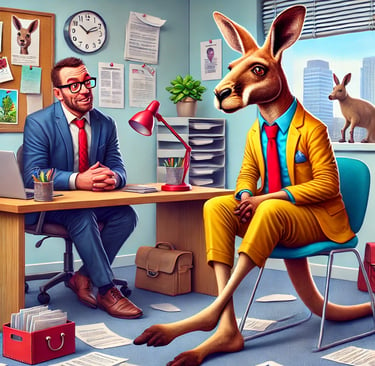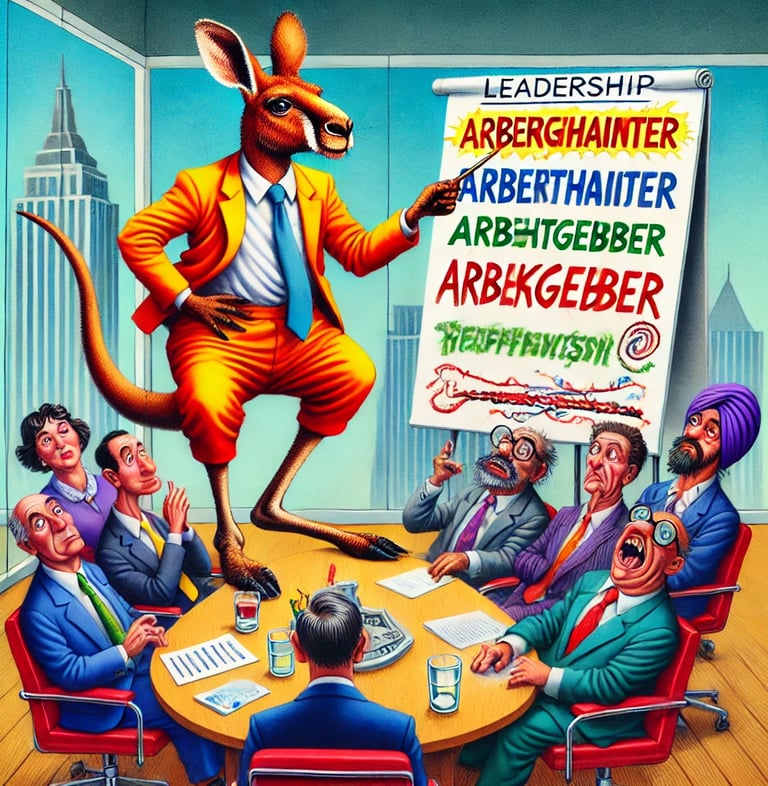The kangaroo is right about leadership
Marc Uwe's Kangaroo chronicles, altough meant as satire get it exactly right when talking about leadership. Argumenting the flawed language of the german words "Arbeitnehmer und Abeitgeber".
LEADERSHIP
Jef Verstraeten
10/17/20243 min read


Satire has a unique ability to cut through the noise and reveal uncomfortable truths, often using humor to expose the absurdities of the world. Marc-Uwe Kling's Kangaroo Chronicles offers such sharp insights, especially in its critique of leadership, hierarchy, and language. In a particular scene, the kangaroo dissects the German terms "Arbeitnehmer" (employee) and "Arbeitgeber" (employer), suggesting that these words, rather than reflecting reality, perpetuate a subtle but important deception. While the story is comedic, its message is deeply relevant for leadership and business today.
The Power of Language: Why "Arbeitnehmer" and "Arbeitgeber" are Backwards
In Kling’s story, the kangaroo pauses mid-conversation to challenge the accepted meaning of "Arbeitnehmer" and "Arbeitgeber." These terms translate literally to "work-taker" (for employees) and "work-giver" (for employers). But as the kangaroo points out, this is a complete reversal of the truth. The employee is the one who gives their labor, while the employer takes that labor and uses it to generate profit. So why do the words tell a different story?
The kangaroo argues that this linguistic framing is no accident. It subtly reinforces the power dynamic between employer and employee, framing the employer as generous—the one who "gives" work—while the employee is positioned as the receiver, the one in need. In reality, it's the employees who provide the value, the skills, and the hard work that fuel the business, while employers profit from that labor.
This clever wordplay hides the true economic exchange and shapes our perception of work and leadership. It reinforces a top-down, hierarchical structure where the employer holds all the cards, despite the reality that businesses are often nothing without their workers. This linguistic illusion is a form of power in itself.
"Eigentlich ist nämlich der sogenannte Arbeitgeber
der Arbeitnehmer und der sogenannte Arbeitnehmer
der Arbeitgeber."
— Das Känguru, Marc-Uwe Kling
"In reality, the so-called employer is the employee,
and the so-called employee is the employer."
— The Kangaroo, Marc-Uwe Kling
A Reflection of Leadership
The kangaroo's satirical commentary isn't just a critique of language—it's a critique of leadership and how we perceive roles within a company. The inversion of "Arbeitnehmer" and "Arbeitgeber" reflects a broader misunderstanding of leadership. Too often, leaders are seen as the ones who bestow opportunities upon employees, rather than recognizing that leadership itself is supported by the hard work of those they lead.
True leadership involves acknowledging this dynamic and understanding that a business is a collective effort. Leaders aren’t simply "giving" work—they are facilitating the exchange of labor and resources in a way that should benefit everyone involved. In this sense, leadership is about empowering employees, recognizing their contributions, and creating an environment where their work is valued and rewarded.
Disrupting the Traditional Model
This critique of leadership also points to a larger shift in how we think about workplace culture and power dynamics. As businesses evolve, the old, hierarchical structures are being replaced by models that focus on collaboration, flexibility, and shared ownership. More companies are adopting leadership styles that prioritize employee well-being, engagement, and personal growth. This is a disruption of the traditional "command-and-control" leadership model, which fits neatly into the outdated definitions of "Arbeitgeber" and "Arbeitnehmer."
In fact, the kangaroo’s critique aligns well with modern trends like flat organizational structures, employee empowerment, and leadership accountability. These changes reflect a deeper understanding that leadership is not about control or power, but about creating conditions where employees can thrive and contribute meaningfully to the organization’s success.
Leadership in the Age of Disruption
So, what does this all mean for leadership in today’s world? The kangaroo’s playful takedown of "Arbeitgeber" and "Arbeitnehmer" should serve as a reminder for leaders to rethink their role. Leadership isn’t about giving or taking—it’s about collaboration, support, and recognizing the reciprocal nature of work.
Modern leadership should focus on creating value for both the business and its employees. Leaders must recognize that their role is not to "give" work but to foster an environment where employees feel empowered to give their best efforts. In turn, employees should be seen not just as receivers of a paycheck but as the driving force behind the company's success.
In the end, perhaps the kangaroo is right: it’s time we flipped the script on leadership and disrupted the outdated power dynamics that still linger in many workplaces. After all, words have power, and it’s through the words we choose—and the roles we assign—that we shape the future of work.
Marc-Uwe Kling’s satirical portrayal of the kangaroo may be fictional, but its message on leadership is real: the language we use to describe work reflects how we think about it. By rethinking terms like "Arbeitnehmer" and "Arbeitgeber," we can begin to challenge the traditional power structures that still govern many workplaces and embrace a more collaborative, empowering approach to leadership.



HQ
Außertal 36, A-6157 Obernberg
Contact
jef@berggids.be
+43 699 1835 6877


